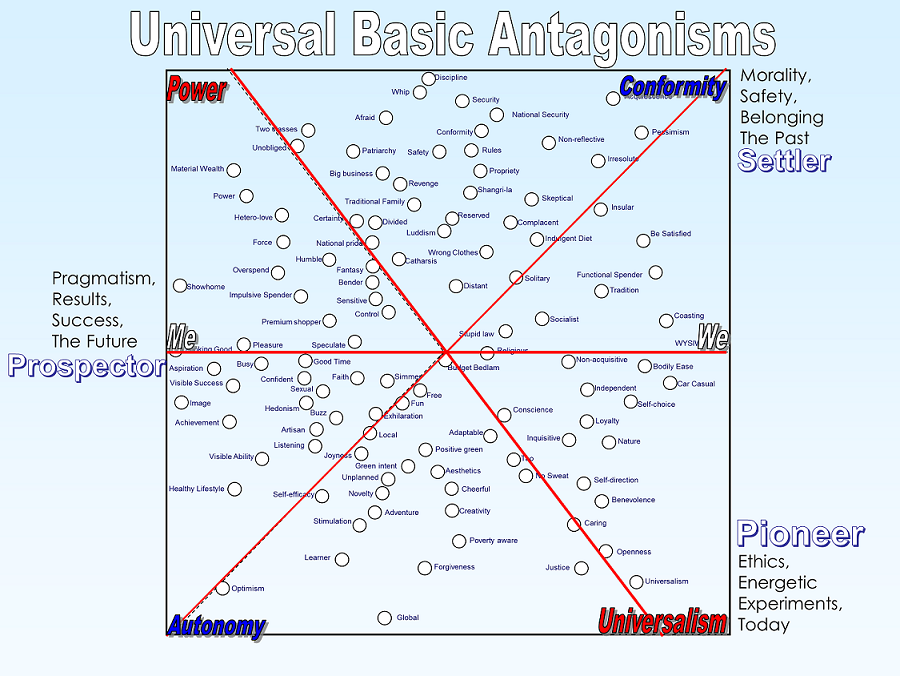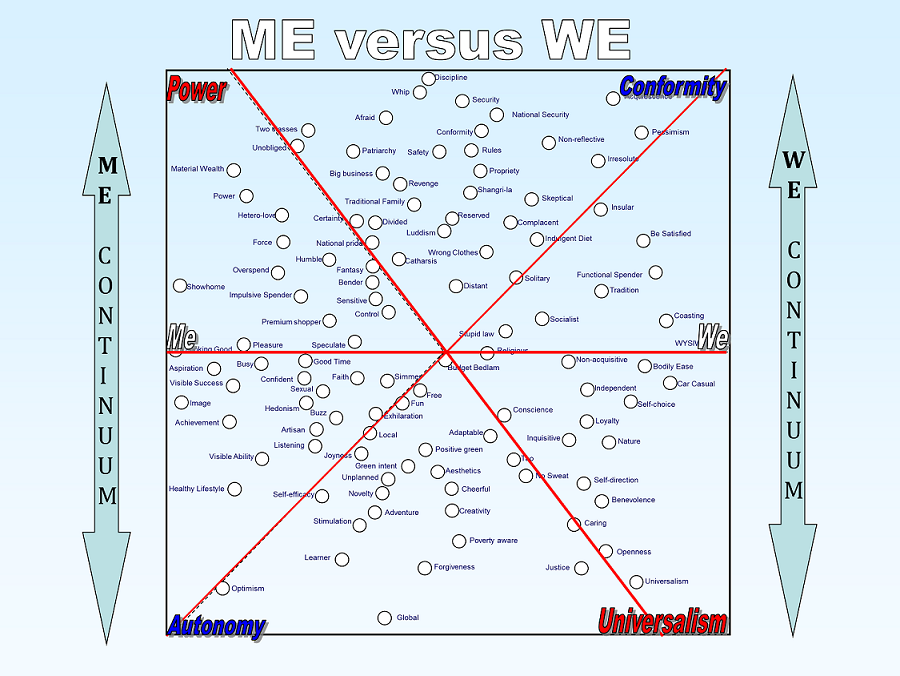

RE-EVOLUTION 1.0
Changing a Failed Dynamic
The UK Labour Party is being pulled apart as its three main "tribes" struggle for its soul.
Can they be unified?
Pat Dade explores the options.
We suggested in our recent article on New, Blue and True Labour that, when failure occurs, a period of soul searching is often the first step to new systems of thought and behaviour. Those systems, as often as not, look and feel nothing like previously successful formulae.
Changing the parameters of success is a function of seeing the world through a different lens. The Maslow Groups provide a robust, evidence-based set of lenses through which to examine new opportunities to reposition failed propositions. They provide a clearly defined, differentiated set of core competencies in terms of personal and social values – both inside and outside any organization.
A set of evidence-based personal and social values systems attributes, overlaid with a dynamic guide to key values orientations, clearly shows the context in which the Maslow Groups sit.

Right-click and select "View Image" to see a larger version.
Each of the three Maslow Groups has a very different orientation of desired behaviours and modes of thought. The ability of organizations to understand these desired needs and behaviours - inside and outside the organization - and to develop strategies to recognise and address them is the primary ingredient to build success.
In our recent article, the Labour Party – an organization currently engaged in soul searching – was seen as having a current reality in which all three Groups were vying to lead the evolution of the Party. Labour’s search is for a new positioning that will satisfy internal and external values and thus put them in a position to achieve electoral success in 2020. Understanding the tensions and dynamics between the three axes is important in developing winning strategies that appeal to more than just one Group.
Pioneers were typified as True Labour because of their continuing robust support of the Party through good times and bad. Prospectors were defined as New Labour and hold values similar to those the Tony Blair-led governments were able to turn into multiple election wins. And the Settlers were defined as Blue Labour, many of them ‘left behind’ as New Labour values became more dominant.
Labour has evolved from a post-WW2 Settler-driven party that shared government for decades until it lost its way in the 1980s and 90s before becoming a post-Thatcher-era Prospector organization. It won three successive elections but failed to build on this success by moving naturally and dynamically into a robust Pioneer organizational framework. During its years of ‘success’, its cohesion and solidarity was replaced by a political pragmatism that eroded its support from non-Prospector Groups.
Labour has a choice of strategies to regain its relevance to a culture that has rejected its New Labour proposition as a valid representation of Prospector values. Having already lost the support of Blue Labour, it no longer enjoys a ‘grand coalition’ of values. Today it faces the prospect of re-evolving a new positioning that may or may not be based on Prospector values – the set of values now re-claimed by the Conservative Party.
To gain insight into their available choices, it’s helpful to look at another set of “meta-values” – ME versus WE.

Right-click and select "View Image" to see a larger version.
Most people concentrate on the first and second axes - Power vs. Universalism and Conformity vs. Autonomy - as factors in developing strategies. For politically sensitive organizations, however, neglecting the insights to be gained from the third axis spells almost certain failure.
During 13 years in government and during the Coalition years, the Labour Party could have become a party that satisfied the needs and values of the Pioneer version of WE. That would be a deeply socially caring organization that respects and rejoices in the disparate values of others. This was the mantle that Nick Clegg donned to give the Liberal Democrats the balance of power in 2010. When it slipped from his shoulders, it was Labour's for the taking. Labour failed to make this change, preferring instead to chase the “rush” of immediate approval. The effect of that choice was displayed in slavish adherence to the short term results of polling and focus groups. Vision-driven strategies need to have a day to day focus but they do not need day to day wins.
The highly pragmatic Prospector ME-driven strategies very often lack a long-term vision and orientation. By necessity they demand day by day wins. This lens creates an environment in which lists and targets loom large. While the ME-driven strategies can and do produce some remarkable results, seemingly overnight, major studies have shown them to be essentially short-term and prone to abuse of their original purpose. This ‘abuse of purpose’ has led many organisations to suffer catastrophic failures that are then discovered to have been generated by the very processes that set them up for short-term success – the reward and recognition of competitive goal attainment rather than reward and recognition for cooperative behaviour leading to sustainable change.
Any strategy based on ME values will attain short-term success – but building bridges to other values sets will be difficult without sustained success. ME strategies evolving from the Settler WE area (Blue Labour) can have success if the Settler WE needs are continually being met. If the ME values of the Prospectors (New Labour) move away from fulfilling them, the short-term advances will be negated as this area of support falls away.
The option for a ME-based strategy is to attract the other end of the WE continuum – the Pioneer-driven True Labour. The issue is then not one of appealing to an essentially conformist group of people, with high tendencies to inertia and ‘loyal’ behaviours, but to a group of highly individualistic but ethical people, who question every aspect of policy and ME-based strategy. They are not so much against day to day wins – they are often the most impatient of supporters – as they are against blindly following a game plan that doesn’t seem to produce the results intended. They understand that they are an integral part of any ‘we’. Their unique life and experiences are like everyone’s unique lives. They understand that, if everyone is different, then everyone is the same in being unique.
This is a mature life-based understanding that creates the most resilient organizations in the world and is changing the nature of all organizations in the world - including political organizations.
The Pioneer version of WE is not about conformity – it is about having the courage to take on any form of authority that cannot or will not change when the objectives ‘we’ agreed on are not being attained. Pioneers understand they are an integral part of ‘we’ and they use the ethical responsibility conferred upon them by this set of values to take on those who try to perpetuate policies and behaviours that are showing signs of failure. They understand that change has to happen at some time, so why not now?
Expecting a ME-driven strategy to appeal to these people is highly optimistic and has been shown time after time to be futile. This may be at the root of many of Labour’s issue - its failure is because of the combination of its success and its unwillingness to evolve with changed conditions.
WE-strategies (True Labour) can and do successfully appeal to many ME-driven people. This can occur in any re-evolutionary climate. This is the basis for many ‘progressive’ organizations and political parties.
That is not the only option open to Labour, however. The over emphasis on the ME orientation in New Labour strategies seems to have left the Blue Labour WE contingent behind – a very avoidable tactical mistake but one easily done when seeing the world through a ME lens.
Another option is to start from the Pioneer end of the WE continuum and set out to attract back the other end of the continuum – the Blue Labour Settlers. The True Labour Pioneers embrace the diversity of others and don’t exclude others in the normal course of events.
This True Labour/Blue Labour ‘coalition’ will not be without its own set of tensions, but disregard for others’ values will not be one of them. The overwhelming desire to be included in groups with others – thus providing validation and safety in numbers – is key to providing an invitation for the Blue Labour defectors to return to their ‘natural home’.
Many of these former Labour voters will be those most hit by, first, the Coalition and now, the Conservative government’s approach to budget cutting – the dreaded austerity measures that had tacit support from the more New Labour ministers. These measures hit many lower paid or retired Blue Labour voters, and the main thing they want is a return to a caring society – one where people know and care about others in their communities and by extension in their local authorities and services.
Ideologically driven cuts to their social support systems are hard to fight in the limited objective campaign groups they may support in their local area but, if they can see a united True Labour/Blue Labour concern and policy driven behaviour change programme, they can unite and become MODERN Labour – a true successor to New Labour.